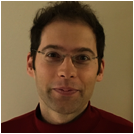Colloquia & Guest Speakers
Quantum entanglement for precision sensing with atoms and light
Dr. Onur Hosten, Department of Physics, Stanford University
Monday, January 9, 2017
10 a.m.
Goergen Hall, Room 101
 Abstract
Abstract
In the last decades, advances in the level of precision in controlling atomic and optical systems opened up the low-energy precision frontier to fundamental physics tests in addition to yielding new applied sensing technologies. In this talk I will focus on our experiments with cold atoms highlighting some of the most recent developments in the prospect of using quantum entanglement to further improve the precision of atomic and optical sensors.
I will describe the generation of 20dB spin-squeezed states of half a million 87Rb atoms inside of an optical cavity. From a practical point of view, the generated states enable up to a 100-fold reduction in required averaging times or atom numbers to achieve a given precision. I will explain the implementation of an atomic clock operating 10 dB beyond the standard quantum limit as well as the investigations of entanglement and Bell correlations in this system. I will then describe the demonstration of a new concept we call quantum phase magnification which utilizes optical cavity-aided interactions between atoms to magnify signals to-be-measured. This technique eliminates the need for low noise detection to achieve phase sensitivities beyond the standard quantum limit. I will conclude with future visions.
Bio
Onur received his Ph.D in Physics from the University of Illinois at Urbana Champaign in the field of experimental quantum optics under the supervision of Paul Kwiat. For his thesis work, he demonstrated the Spin Hall effect of Light for the first time, while establishing the first practical application of quantum weak measurement techniques which were used to amplify the demonstrated effect. He was a thesis prize finalist for the AMO Physics division of the American Physical Society in 2011. He did his postdoctoral work with Mark Kasevich in the Physics department at Stanford University, focusing on cavity quantum electrodynamics with large atomic ensembles for precision measurement applications. He developed techniques to utilize atom-light interactions for manipulating the collective states of cold atomic systems. Using quantum entanglement as a resource, he demonstrated unprecedented levels of sensitivity enhancements to atom-interferometric sensors. He has been a research associate at Stanford university since 2015.
Location:Goergen 101
Refreshments will be served.
